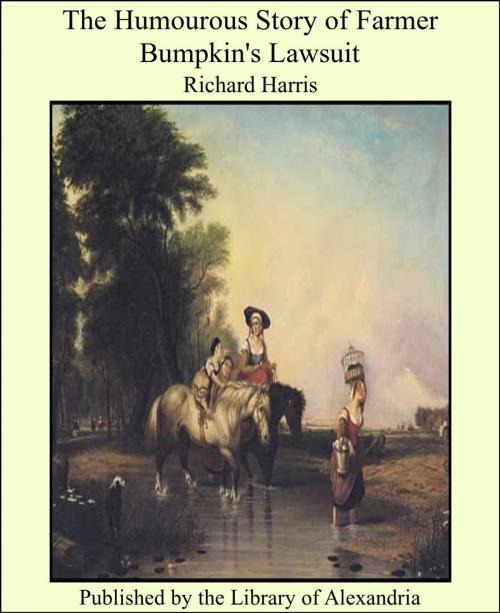The Humourous Story of Farmer Bumpkin's Lawsuit
Nonfiction, Religion & Spirituality, New Age, History, Fiction & Literature| Author: | Richard Harris | ISBN: | 9781613103500 |
| Publisher: | Library of Alexandria | Publication: | July 29, 2009 |
| Imprint: | Library of Alexandria | Language: | English |
| Author: | Richard Harris |
| ISBN: | 9781613103500 |
| Publisher: | Library of Alexandria |
| Publication: | July 29, 2009 |
| Imprint: | Library of Alexandria |
| Language: | English |
Considering the enormous interest which the Public have in “a more efficient and speedy administration of justice,” I am not surprised that a Second Edition of “Mr. Bumpkins Lawsuit” should be called for so soon after the publication of the first. If any proof were wanting that I had not overstated the evils attendant on the present system, it would be found in the case of Smitherman v. The South Eastern Railway Company, which came before the House of Lords recently; and judgment in which was delivered on the 16th of July, 1883. The facts of the case were extremely simple, and were as follow:—A man of the name of Smitherman was killed on a level crossing of the South Eastern Railway Company at East Farleigh, in December, 1878. His widow, on behalf of herself and four children, brought an action against the Company on the ground of negligence on the part of the defendants. The case in due course was tried at the Maidstone Assizes, and the plaintiff obtained a verdict for £400 for herself and £125 for each of the children. A rule for a new trial was granted by the Divisional Court: the rule for the new trial was discharged by the Court of Appeal. The Lords reversed the decision of the Court of Appeal, and ordered a new trial. New trial took place at Guildhall, City of London, before Mr. Baron Pollock; jury again found for the plaintiff, with £700 agreed damages: Company thereby saving £200. Once more rule for new trial granted by Divisional Court: once more rule discharged by Court of Appeal: once more House of Lords reverse decision of Court of Appeal, and order second new trial. So that after more than four years of harassing litigation, this poor widow and her children are left in the same position that they were in immediately after the accident—except that they are so much the worse as being liable for an amount of costs which need not be calculated. The case was tried by competent judges and special juries; and yet, by the subtleties of the doctrine of contributory negligence, questions of such extreme nicety are raised that a third jury are required to give an opinion upon the same state of facts upon which two juries have already decided in favour of the plaintiff and her children. Such is the power placed by our complicated, bewildering, and inartistic mode of procedure, in the hands of a rich Company. No one can call in question the wisdom or the learning of the House of Lords: it is above criticism, and beyond censure; but the House of Lords itself works upon the basis of our system of Procedure, and as that is neither beyond criticism nor censure, I unhesitatingly ask, Can Old Fogeyism and Pettifoggism Further go? Lamb Building, Temple
Considering the enormous interest which the Public have in “a more efficient and speedy administration of justice,” I am not surprised that a Second Edition of “Mr. Bumpkins Lawsuit” should be called for so soon after the publication of the first. If any proof were wanting that I had not overstated the evils attendant on the present system, it would be found in the case of Smitherman v. The South Eastern Railway Company, which came before the House of Lords recently; and judgment in which was delivered on the 16th of July, 1883. The facts of the case were extremely simple, and were as follow:—A man of the name of Smitherman was killed on a level crossing of the South Eastern Railway Company at East Farleigh, in December, 1878. His widow, on behalf of herself and four children, brought an action against the Company on the ground of negligence on the part of the defendants. The case in due course was tried at the Maidstone Assizes, and the plaintiff obtained a verdict for £400 for herself and £125 for each of the children. A rule for a new trial was granted by the Divisional Court: the rule for the new trial was discharged by the Court of Appeal. The Lords reversed the decision of the Court of Appeal, and ordered a new trial. New trial took place at Guildhall, City of London, before Mr. Baron Pollock; jury again found for the plaintiff, with £700 agreed damages: Company thereby saving £200. Once more rule for new trial granted by Divisional Court: once more rule discharged by Court of Appeal: once more House of Lords reverse decision of Court of Appeal, and order second new trial. So that after more than four years of harassing litigation, this poor widow and her children are left in the same position that they were in immediately after the accident—except that they are so much the worse as being liable for an amount of costs which need not be calculated. The case was tried by competent judges and special juries; and yet, by the subtleties of the doctrine of contributory negligence, questions of such extreme nicety are raised that a third jury are required to give an opinion upon the same state of facts upon which two juries have already decided in favour of the plaintiff and her children. Such is the power placed by our complicated, bewildering, and inartistic mode of procedure, in the hands of a rich Company. No one can call in question the wisdom or the learning of the House of Lords: it is above criticism, and beyond censure; but the House of Lords itself works upon the basis of our system of Procedure, and as that is neither beyond criticism nor censure, I unhesitatingly ask, Can Old Fogeyism and Pettifoggism Further go? Lamb Building, Temple















